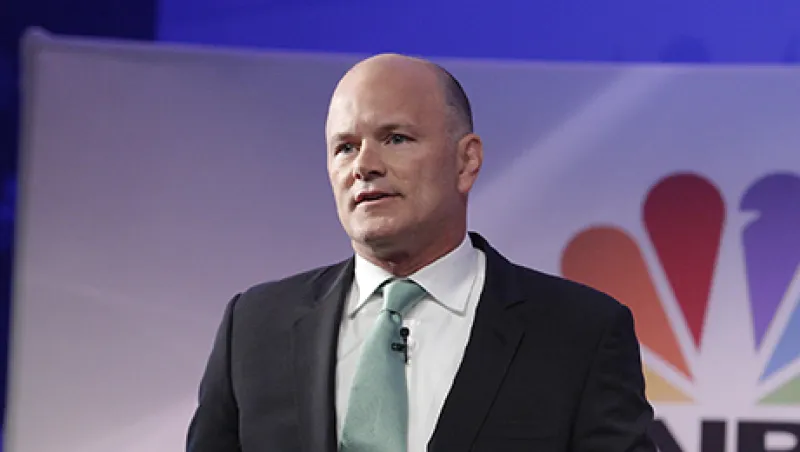Amid all the talk about Janet Yellen and the Federal Reserve, the strength of the U.S. stock market and its thriving sectors, and an “aw shucks” moment between activist investors Carl Icahn and William Ackman at Wednesday’s Delivering Alpha conference, at least one money manager brought his passport to the Pierre hotel. Speaking on the morning’s Best Ideas panel, Michael Novogratz, a principal and director at Fortress Investment Group, went global with his picks, identifying four markets ripe with investment opportunities: Argentina, Brazil, India and Japan.
While his fellow panelists offered the audience baskets of stocks, Novogratz stuck to his macro guns, even as the strategy in which he has long specialized has “been a tough space to deliver alpha” this year. Chicago-based Hedge Fund Research’s Macro Index was up just 0.89 percent through June. Betting on the dollar, which was supposed to be the trade of the year, has been “like waiting for the boy who cried wolf,” he said.
Novogratz, who served as a helicopter pilot in the U.S. Army before starting his career on Wall Street in 1989 at Goldman, Sachs & Co., acknowledged that Japan is not a new trade. Still, the country continues to be a good place to put investment dollars to work, he said, thanks to Abenomics, the economic policies of Prime Minister Shinzo Abe that have helped the aging nation rejuvenate its stock market. Although retail investors in Japan continue to be reluctant to get back into stocks, Novogratz is encouraged by the recent equity purchases by the GPIF, Japan’s biggest public pension fund. He pointed to the Tokyo Stock Price Index, better known as Topix, and the dollar/yen trade as good places to be long.
Novogratz moved southwest to India, home to the world’s best-performing stock market this year. The second most-populated country on earth experienced a startling shift in power during its May election, with the Bharatiya Janata Party grasping outright majority of its lower house of Parliament. The BJP’s leader, and India’s new prime minister, Narendra Modi is working toward a cultural shift that is not without its obstacles, Novogratz said. One mantra that emerged from Modi’s campaign, he explained, was “toilets first, temples later,” in an effort to encourage private investment and reform a struggling infrastructure.
Novogratz, who joined Fortress in 2002, is CIO of the Fortress Macro Fund and the Drawbridge Global Macro Fund. He has played India through long equity and currency positions. Monetary policy coming out of Mumbai has made the currency trade more difficult, Novogratz said, as the Reserve Bank of India has kept the rupee weak, but he sees the currency appreciating in the years to come as the market bolsters.
Moving west, the conversation shifted to Latin America. Despite a successful month hosting the World Cup, Brazil “is so bad it’s good,” Novogratz told the crowd at Delivering Alpha. While the outside world took its vacation days to flock to Rio de Janeiro and São Paulo, locals were more concerned with their shoddy government’s bleak economic outlook. Facing a recession, current President Dilma Rousseff will lose October’s election, Novogratz predicted, intimating support for opponent Aécio Neves, who has said he would name former Central Bank of Brazil president Arminio Fraga to the Finance minister’s post.
As with Japan and India, Novogratz is banking on reform to spur the stock market in Brazil. Likewise, he is bullish on interest rates on the heels of the central bank finishing a rate-hike cycle and primed to lower rates.
Germany may have embarrassed Brazil 7-1 at the Estádio Mineirão in Belo Horizonte, but perhaps the deepest sting came from rival Argentina, who finished ahead of the Seleção, losing to Germany in the final. Argentina and Brazil can take solace in both making Novogratz’s best ideas picks at Delivering Alpha.
Like its neighbor to the north, Argentina is itching for new leadership. Under that country’s laws, President Cristina Fernández de Kirchner will not be able to run for a third consecutive term, but if the midterm elections of last fall are any indication, her popularity has been dwindling for some time anyway. Of her potential successors, Novogratz described the possible candidates for the October 2015 election as “good, better and best. As he explained, the markets are strengthening already in anticipation of a regime change.
When questioned, Novogratz acknowledged the one gigantic question mark looming over Argentina in the immediate future: the fight between Kirchner’s office and a group of hedge fund firms, including Paul Singer’s Elliott Management and Mark Brodsky’s Aurelius Capital Management, over bond payments. The Supreme Court recently ruled in favor of the creditors, asserting that the Argentine government must fork over payments to the sum of around $1.5 billion, or face its second default of the 2000s. The Wall Street Journal estimated that any settlements will likely lead to more claims and a total bill of around $13 billion.
Novogratz is counting on a resolution sooner than later, putting the chances of something happening in the next two weeks at 75 percent. Should Argentina misplay its hand and default, he believes this will “kick the can” until December, when the RUFO clause expires, with some assets selling off, but a deal getting done eventually. RUFO is the “Rights Upon Future Offers” that the government gave to bondholders who participated in Argentina’s 2005 debt restructuring.
The window for some sort of resolution is small, making this bet the most pressing for Novogratz and Fortress of the four he presented at Delivering Alpha. The next two weeks will set the stage, and “if something happens, Argentina is going to take off like fire,” he says. “If something doesn’t happen, and they actually have a default, you’ll certainly see a sell-off, but that sell-off will be met by capital coming in. That would be a buying opportunity if you’re not already in the trade.”
Get more on hedge funds and emerging markets.






